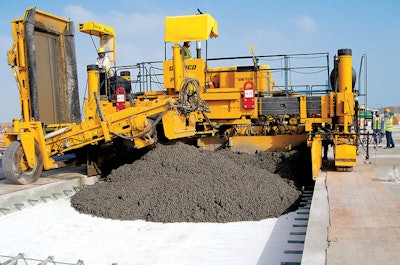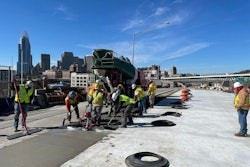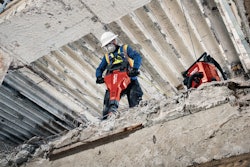
At the recent World of Concrete tradeshow, the American Concrete Pavement Association laid out four ways it plans to support the roadbuilding industry in 2025.
A key issue, according to ACPA, lies in funding from the federal Infrastructure Investment and Jobs Act and the Inflation Reduction Act. Factors including inflation, project backlog and transportation-department turnover has left certain goals and needs unmet, bringing more focus on state agencies to use their current resources effectively.
“Nationwide, growth in the concrete paving highway market has been modest. With the exception of one high-performing state, growth has been about 2.7%,” said Laura O’Neill Kaumo, president and CEO of ACPA. “We anticipate 4%-5% growth in 2025 – but that forecast is not certain, and with the IIJA expiring in 2026, along with hearings beginning in Congress now about reauthorization, ACPA is calling on Congress to continue to invest in highway infrastructure and for state highway agencies to have a plan to use their resources as effectively as possible.”
ACPA plans to address the following in 2025:
- Support inter-industry competition to reduce costs. ACPA will support DOTs in increasing competition during the pavement bidding process, including between material industries. This, according to the Massachusetts Institute of Technology Concrete Sustainability Hub, will have a greater impact on lowering unit costs than rising competition between contractors. ACPA will also fund research on how inter-industry competition impacts unit prices.
- Highlight concrete as a sustainability win. The association plans to invest time in 2025 toward showing how concrete pavements can contribute to sustainability, including how it withstands structural integrity after flooding better than asphalt pavement.
- Investment in RC3. 2025 will see ACPA continue to invest in the Reduced-Carbon Concrete Consortium, an industry advisory group that provides expertise to highway agencies, contractors and the cement and concrete industry. Members of RC3 include ACPA, the National Concrete Pavement Technology Center, the Concrete Advancement Foundation and the National Ready Mixed Concrete Association.
- MIT Collaboration. ACPA will also spend time in 2025 working with the MIT Concrete Sustainability Hub on its simplified pavement life-cycle assessment tool, which can be found here and accessed with a free account. The program allows users to adjust factors including precipitation days, materials, emissions and traffic content to conduct environmental analysis of pavements.











